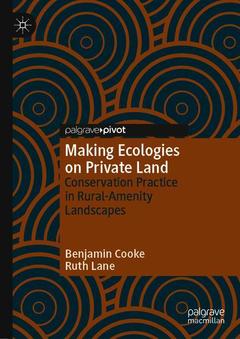Making Ecologies on Private Land, 1st ed. 2020 Conservation Practice in Rural-Amenity Landscapes
Auteurs : Cooke Benjamin, Lane Ruth

This book explores conservation practices on private land, based on research conducted with landholders in the hinterlands of Melbourne, Australia. It examines how conservation is pursued as an intimate interaction between people and ecologies, suggesting that local ecologies are lively participants in this process, rather than simply the object of conservation, and that landholders develop their ideas of environmental stewardship through this interaction. The book also explores the consequences of private property as a form of spatial organisation for conservation practice; the role of formative interactions with ecologies in producing durable experiential knowledge; how the possibilities for contemporary conservation practice are shaped by historical landscape modification; and how landholders engage with conservation covenants and payment schemes as part of their conservation practice. The authors conclude with ideas on how goals and approaches to private land conservation might be reframed amid calls for just social and ecological outcomes in an era of rapid environmental change.
Dr Benjamin Cooke is a Senior Lecturer at RMIT University in Melbourne, Australia. He is a human geographer who explores the critical social science dimensions of nature conservation.
Dr Ruth Lane is a Senior Lecturer at Monash University in Melbourne, Australia. She is a human geographer whose research focuses on the intersections between social change, environmental degradation and environmental governance.
Explores conservation practices on private land
Examines how conservation is pursued as an intimate interaction between people and ecologies
Concludes with ideas on how goals and approaches to private land conservation might be reframed
Investigates the consequences of private property as a form of spatial organisation for conservation practice
Discusses the role of formative interactions with ecologies in producing durable experiential knowledge
Date de parution : 11-2019
Ouvrage de 125 p.
14.8x21 cm
Disponible chez l'éditeur (délai d'approvisionnement : 15 jours).
Prix indicatif 58,01 €
Ajouter au panier


